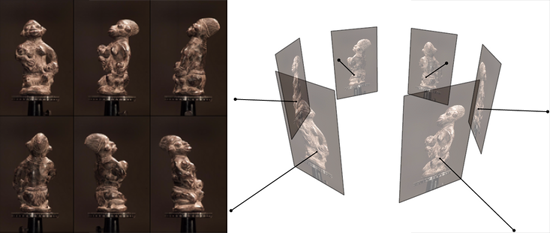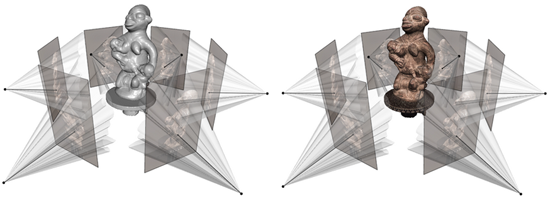|
3DVisA Resources
3DVisA Index of 3D Projects: Museum Applications
SCULPTEUR
The EU-funded project IST-2001-35372, SCULPTEUR, or Semantic and Content-based Multimedia Exploitation for European Benefit, was concerned with the storage and retrieval of information about 3D museum objects and the Semantic Web. SCULPTEUR
built upon the results of an earlier project called
Artiste, An Integrated Art Analysis and Navigation Environment.
The latter project was carried out from 2000-2002 and focused on two-dimensional data.

Fig. 1. 3D object modelling: image acquisition and camera calibration. See general
description of the algorithm which supports this technique. © Carlos Hernández Esteban and SCULPTEUR, 2004.
Reproduced with kind permission.
As part of the project, Giunti Interactive Labs have developed a 3D virtual museum based on the experience of the Art Deco Gallery at the Victoria and Albert Museum
in London. Virtual museum objects in the form of VRML models may be 'dragged and dropped' into virtual gallery space. The application may assist curators,
instructional designers and educators to build 3D Virtual Learning Objects.
A modelling technique, based on silhouette and stereo fusion was developed for generating 3D virtual objects with high-resolution colour texture.

Fig. 2. 3D object modelling: 3D reconstruction and texture mapping. See general description of the algorithm
which supports this technique. © Carlos Hernández Esteban and SCULPTEUR, 2004.
Reproduced with kind permission.
A new 3D modelling algorithm has been proposed that is able to efficiently fuse silhouettes and stereo for high quality 3D object reconstruction.
This algorithm has been successfully tested in real life in the framework of the SCULPTEUR, where more than 150 objects have been acquired using the proposed technique.
The core of the method is based on a deformable model, which defines the framework where texture and silhouette information can be fused. This reconstruction technique has been further
improved in order to simplify the overall acquisition process. As a result, camera calibration, one of the critical steps of any Computer Vision technique, has been simplified.
The proposed new camera calibration algorithm uses silhouettes as the only input data. This technique makes use of the silhouettes in a novel way in order to recover the camera
parameters under circular motion, which is commonly used for image-based 3D object modelling. Assuming that the silhouettes are 'sufficiently' well extracted,
the silhouette coherence has been proposed as a global quality measure for the calibration of a subset of the camera parameters by maximising the overall silhouette coherence.
Together with the proposed reconstruction method, silhouette-based camera calibration allows to obtain high quality 3D reconstructions without the use of any calibration pattern.
Project dates: 1 May 2002 to 1 May 2005
Resource status: The Virtual Museum and other demonstrations, including a link to the database of 3D models on the Telecom Paris website, are available on the SCULPTEUR website.
Partners:
France: Centre de recherche et de restauration des musées de France; Musée de Cherbourg; Telecom Paris: Ecole nationale supérieure des télécomunications: Carlos Hernandez.
Italy: Giunti Interactive Labs: Fabrizio Giorgini.
UK: National Gallery, London; Victoria and Albert Museum, London; School of Electronics and Computer Science University of Southampton: Paul H. Lewis, Kirk Martinez and Patrick AS Sinclair; IT Innovation, Southampton.
Sources and further details:
SCULPTEUR Project website.
SCULPTEUR pages on the School of Electronics and Computer Science, University of Southampton website).
Goodall, S., Lewis, P. and Martinez, K. (2005), '3-D Shape Descriptors and Distance Metrics for Content-Based
Artefact Retrieval', Proceedings of Storage and Retrieval Methods and Applications for Multimedia, Edited by Lienhart, R. W., Babaguchi, N. and Chang, E. Y., 5682,
pp. 87-97, San Jose, California, USA.
Addis, M. J., Goodall, S., Lewis, P. H., Martinez, K. and Sinclair, P. A. S. (forthcoming) 'Concept browsing for multimedia
retrieval in the SCULPTEUR project', Proceedings of the 2nd Annual European Semantic Web Conference, Heraklion, Crete 2005.
Goodall, S., Lewis, P., Martinez, K., Sinclair, P., Addis, M., Lahanier, C. and Stevenson, J. (2004),
Knowledge-based Exploration of Multimedia Museum Collections, Proceedings of European Workshop on the Integration of Knowledge, Semantics and Digital Media Technology (EWIMT),
London, UK
Hernández Esteban, C. and Schmitt, F. (2004), 'Silhouette and Stereo Fusion for 3D Object Modeling', Ph.D. thesis, Ecole Nationale Supérieure des Télécommunications.
Algorithm overview and a PDF document to download.
Record compiled by Anna Bentkowska-Kafel, 11 September 2006. Last updated: 12 June 2007.
3DVisA gratefully acknowledges the help of Carlos Hernández Esteban with preparation of this record.
© SCULPTEUR and 3DVisA, 2006.
Back to the list of 3D projects
| 